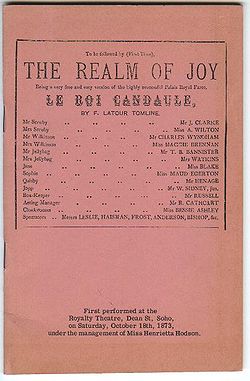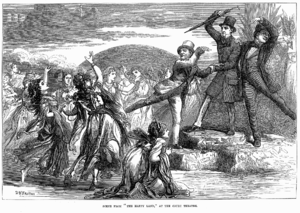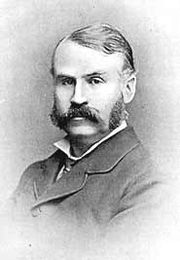
The Realm of Joy
Encyclopedia

W. S. Gilbert
Sir William Schwenck Gilbert was an English dramatist, librettist, poet and illustrator best known for his fourteen comic operas produced in collaboration with the composer Sir Arthur Sullivan, of which the most famous include H.M.S...
, writing under the pseudonym "F. Latour Tomline". It opened at the Royalty Theatre
Royalty Theatre
The Royalty Theatre was a small London theatre situated at 73 Dean Street, Soho and opened on 25 May 1840 as Miss Kelly's Theatre and Dramatic School and finally closed to the public in 1938. The architect was Samuel Beazley, a resident in Soho Square, who also designed St James's Theatre, among...
on 18 October 1873, running for about 113 performances, until 27 February 1874.
The play is based on the farce, Le Roi Candaule, by Henri Meilhac
Henri Meilhac
Henri Meilhac , was a French dramatist and opera librettist.-Biography:Meilhac was born in Paris in 1831. As a young man, he began writing fanciful articles for Parisian newspapers and vaudevilles, in a vivacious boulevardier spirit which brought him to the forefront...
and Ludovic Halevy
Ludovic Halévy
Ludovic Halévy was a French author and playwright. He was half Jewish : his Jewish father had converted to Christianity prior to his birth, to marry his mother, née Alexandrine Lebas.-Biography:Ludovic Halévy was born in Paris...
, two of Jacques Offenbach
Jacques Offenbach
Jacques Offenbach was a Prussian-born French composer, cellist and impresario. He is remembered for his nearly 100 operettas of the 1850s–1870s and his uncompleted opera The Tales of Hoffmann. He was a powerful influence on later composers of the operetta genre, particularly Johann Strauss, Jr....
's favourite librettists.
Background
The Realm of Joy is set in the lobby of a theatre where a politically scandalous play, "The Realm of Joy" is being performed - a clear reference to Gilbert's play from the same year, The Happy LandThe Happy Land
The Happy Land is a play with music written in 1873 by W. S. Gilbert and Gilbert Arthur à Beckett. The musical play burlesques Gilbert's earlier play, The Wicked World...
(1873), which was still running on the first night of this piece. The Lord Chamberlain had briefly banned The Happy Land for its political satire and for costuming its characters to resemble particular government officials, which is lampooned in this play by references to "the Lord High Disinfectant" and by the descriptions of the banned costumes by Jane and Sophie.
Gilbert likely used the pseudonym "Tomline" as a taunt to the Lord Chamberlain, as the pseudonym would already have been known from The Happy Land. The Lord Chamberlain's Office licensed the play despite its provocative tone in order to prevent a round of bad publicity like the one which arose from the Happy Land affair. Early in the run of the play, the title was changed to The Realms of Joy.
In The Happy Land (1873), The Realm of Joy and Charity
Charity (play)
Charity is a drama in four acts by W. S. Gilbert that explores the issue of a woman who had lived with a man as his wife without ever having married. The play analyses and critiques the double standard in the Victorian era concerning the treatment of men and women who had sex outside of marriage,...
(1874), Gilbert pushed the boundaries of how far satire could go in the theatre. Charity moved beyond political satire to critique the contrasting ways in which Victorian society treated men and women who had sex outside of marriage, which anticipated the 'problem plays' of Shaw
George Bernard Shaw
George Bernard Shaw was an Irish playwright and a co-founder of the London School of Economics. Although his first profitable writing was music and literary criticism, in which capacity he wrote many highly articulate pieces of journalism, his main talent was for drama, and he wrote more than 60...
and Ibsen
Henrik Ibsen
Henrik Ibsen was a major 19th-century Norwegian playwright, theatre director, and poet. He is often referred to as "the father of prose drama" and is one of the founders of Modernism in the theatre...
.
Roles

| Box-Keeper |
| Two Spectators |
| Cloakwoman |
| Spectator in Box |
| A Very Fat Gentleman |
| Quisby | } | Two "swells" |
| Jopp |
| Mr. Jellybag |
| Mrs. Jellybag, his wife |
| Jane | } | Their daughters |
| Sophie |
| Mr. Wilkinson |
| Mrs. Scruby (or Screwby, in the licencing copy) |
| Mr. Scruby, her husband |
| Acting Manager |
| Mrs. Wilkinson |
| Other spectators, etc. |
Synopsis

The Happy Land
The Happy Land is a play with music written in 1873 by W. S. Gilbert and Gilbert Arthur à Beckett. The musical play burlesques Gilbert's earlier play, The Wicked World...
, is being produced. The play is so popular that spectators are literally crammed into the private boxes, sitting on each others' laps. The boxkeeper thinks that the play is scandalous, but "Society comes because Society is loth to believe in such audacity on mere hearsay, and flocks to the theatre in thousands to witness the appalling spectacle for themselves." Quisby and Jopp, a pair of "swells", arrive to see the play for the sixty-eighth and eighty-fifth time, respectively - but only in order to "moralise over the depravity of human nature" and "see the spectators". Mr. and Mrs. Jellybag have taken their young daughters (who interest Quisby and Jopp greatly) but arrange for them to be sent out with the cloakwoman whenever things get too scandalous. They're soon sent back out, and declare themselves much amused (A "melancholy instance of juvenile depravity" according to the cloakwoman.)
Meanwhile, Mr. Wilkinson has arrived with Mrs. Scruby. Mr. Scruby now arrives, waiting for Mrs. Wilkinson - but his box has been sold to another person as well. Both Mr. Scruby and Mr. Wilkinson have forbidden their wives from seeing the piece, and so have agreed to take each others' wives to it. Farcical complications ensue, with attempts to hide each others' wives from the other husband. In the confusion, the Jellybags' daughters give in to Quisby and Jopp's flirting and head off with them, unnoticed by the Cloakwoman. Everything comes out between the Scrubys and Wilkinsons, and, as they all were guilty of the same act, they forgive each other and go in to watch the show - but it's over! Ah, well! Now they can come as often as they like together.

